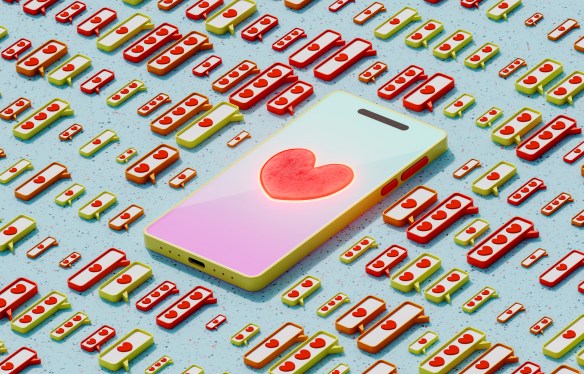When we gather around the proverbial fire to share our online dating stories, we usually talk about the usual suspects: Tinder, Bumble, Hinge, Grindr, and sometimes more niche apps. But ever since Facebook Dating launched in 2019, I am not sure I have ever heard a story that began there. I know more people who have met in Facebook meme groups than on the actual Facebook Dating product.
It turns out my anecdotal data may be wrong because people actually do use Facebook Dating. Meta shared user metrics for the first time on Monday, revealing that Facebook Dating has 21.5 million daily active users across 52 countries.
Facebook Dating is a feature within Facebook, rather than a standalone app, and Facebook puts its dating product front and center in the main bottom navigation bar on the app. Even if your relationship status is not set to single, Facebook Dating remains in its prominent spot.
What is most surprising, though, is how Facebook Dating seems to be slowly catching on among young people. The platform counts 1.77 million users between the ages of 18 and 29 in the United States, which is still not quite up to par with the usual suspects, but it is getting closer. App analytics firm Sensor Tower estimated that as of this summer in the United States, Tinder had 7.3 million active users across all age groups, Hinge had 4.4 million, Bumble had 3.6 million, and Grindr had 2.2 million.
Facebook has publicly addressed the fact that it struggles to keep Generation Z and young millennials on the platform. Yet the company said last year that daily conversations on Facebook Dating in the 18 to 29 demographic spiked by 24 percent.
Facebook Dating’s best feature is not something it actively does, but rather, it is what Facebook Dating does not do. Unlike Hinge, you do not have to pay to unlock your most desirable matches or buy other premium features that supposedly bring you closer to finding the one.
Hinge debuted its Standouts feature in December 2020, which has become symbolic of everything wrong with dating apps. Hinge’s algorithm finds the people whom it thinks you will be most interested in, then places them in their own elite tab of the app. The only way to swipe right on these people is to give them a rose, which users get for free once a week, unless you buy more roses for four dollars each. Even if you buy roses, your potential future partner will know you used a precious rose on him, which is kind of embarrassing. So, like a true star-crossed-lovers situation, some users have devised increasingly complex schemes to trick the Hinge algorithm into freeing these people from rose jail.
By comparison, Facebook Dating’s free model looks pretty good. It is not that Mark Zuckerberg is a benevolent Silicon Valley cupid. Meta is already making money off of you by relentlessly collecting your data, so it does not need you to buy roses. But as users grow more aggrieved with their usual rotation of apps, Facebook Dating may not seem so cringe anymore.

